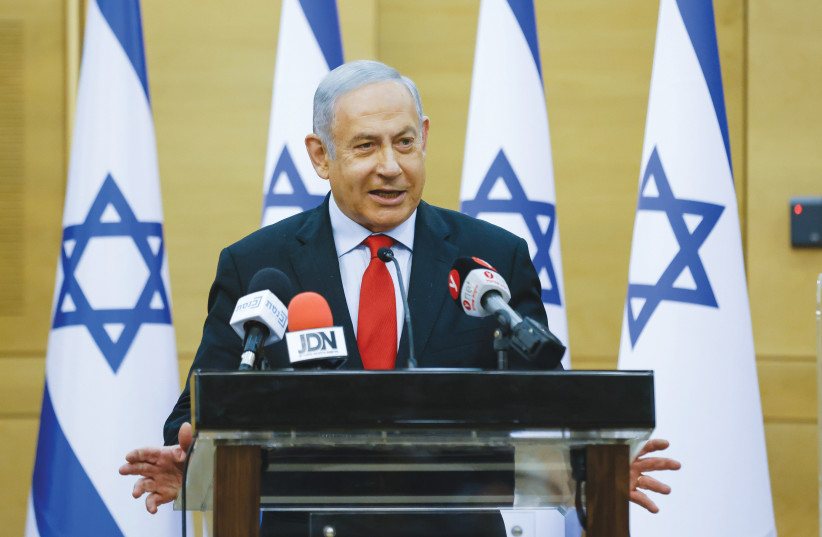The voting in the Knesset on Tuesday night was historic for two reasons.
The first was the most obvious: the Knesset was passing a series of personal laws for different ministers so they can join the government. The laws were not for the benefit of the people or even a specific party. Rather, they were about individuals, like the bill for Arye Deri that is meant to allow a convicted criminal and someone who months ago promised in court to leave politics to serve as a senior cabinet minister.
The second reason the voting was historic was that the legislative changes being debated were taking place before the establishment of a new government. This was strange. When Benjamin Netanyahu carried the Likud and his right-wing religious bloc to electoral victory on November 1, it seemed at first that the coalition talks would be a walk in the park. The parties were ideologically aligned, agreed on the national hot-button issues and had walked arm-in-arm through five elections and almost four years of campaigning.
Instead, the coalition talks have been one long and painful headache for Netanyahu and, sadly for the Likud leader, he has no one to blame but himself. His future partners knew that if they first swore in the government and then tried to pass the laws they asked for, Netanyahu would likely find a way to stall. After all, that is what he has done countless times in the past.
Due to this lack of trust, the partners – Religious Zionist Party, Otzma Yehudit, Shas and United Torah Judaism – all insisted that the laws be changed first. Only once they are legislated, will the parties agree to enter the government.

While strange, the partners are not wrong. Netanyahu has made promises to coalition partners in the past that he very quickly violated. The most recent example was when he publicly promised “no tricks and no shticks” when establishing a government with Benny Gantz and then refused to adhere to the agreement so he could remain in office.
And if the coalition talks weren’t tough enough, then came the news, on Sunday night, that the Likud and UTJ were discussing a series of religious reforms that, if implemented, would alter the character of Israel and turn it into something of a Jewish version of an Islamic Republic.
The demands varied and included stopping the use of power plants producing electricity on Shabbat, increasing the number of separate beaches, funding the genizah (proper burial) of holy books and establishing institutes dedicated to answering halachic questions. The Haredi party also asked to increase the study of the Bible in secular schools and to begin teaching Talmud there, as well.
Will Israel become a halachic state?
While Netanyahu declared on Monday that he would not allow Israel to become a Halachic state, one has to wonder how these politicians even thought they could ask for all of these religious reforms.
What gave them the feeling that it was legitimate to assume that they could grossly interfere in the education of secular children? Why did they think that they could decide – because of a minority of Haredim – that the entire national electrical grid needs to be changed or that the state should have to spend hundreds of millions of shekels to accommodate this extreme way of life?
Sadly, there is no real way to describe this situation other than calling it a brewing religious war within the country.
There are forces here that seem to believe that because they have political power now, they can do whatever they want. They claim that this is the definition of democracy when what it really is, is a misunderstanding of the system of democracy. Yes, democracy is about the people electing their leaders and in this case, Israelis have done so. But, it does not mean the elected officials can do whatever they want. Harming the rights of citizens is not democratic, weakening the courts is not democratic and trampling religious rights is not, as well.
What these ultra-Orthodox politicians fail to realize is that what they do not only harms the country but also harms and weakens the Jewish religion. They have politicized Judaism and they are turning people away from our ancient traditions. As Zvika Klein wrote this week, just look at marriage rates through the Chief Rabbinate, which have dropped by about 10% in the last decade. People are staying away and they have good reason to.
It doesn’t have to be this way. Judaism can be an open free market. Netanyahu knows about privatization and he still takes great pride in the economic reforms he instituted 20 years ago, when he was finance minister. He broke up government monopolies, privatized government-owned companies, and cut welfare and government subsidies.
Opening up the market was Netanyahu’s brand. The Haredim want him to go backward. Hopefully, he will know how to stand his ground.
***
On Wednesday, The Jerusalem Post ran an ad on its front page with a picture of the Moroccan national team and the words “We are all Moroccans” ahead of the match that evening between Morocco and France.
It was an ad placed by a supporter of the team and it was almost entirely well-received. There were, however, a number of people who were upset at the paper and by extension the Moroccan team, which has players who dare to wave Palestinian flags after their games.
Some Israelis and Jews have taken great offense at the waving of Palestinian flags, calling it political, inappropriate and a backstabbing of the normalization between Jerusalem and Rabat.

While it is unclear what the purpose is behind the flag waving and whether, as some reports indicate, the Hamas-supporting Qataris are behind it, Israelis need to understand that Qatar is an Arab country, Morocco is an Arab team and the Palestinians are a cause they care about. While Israel might like to pretend that the conflict with the Palestinians does not exist, the rest of the world is not going along with the charade.
There is a Palestinian people who live in cities and towns just 15 minutes from Jerusalem and Tel Aviv and find themselves almost daily under Israeli military control, whether when embarking on a West Bank highway to get to a different town or when the Israeli military enters their cities at night to hunt down suspected terrorists. All of these measures are needed for Israel’s security but we should not pretend that they do not undermine the quality of life in the West Bank and do not impact regular Palestinians.
The flags are a reminder that the public in the countries with which Israel has normalized relations, like Morocco, has not forgotten the Palestinians. The waving of the flags is a reminder that this is a conflict that is unresolved and should not be ignored.
Israelis should not be afraid of the flags. They are not Hamas flags or Hezbollah flags. Yes, they represent a desire for Palestinian self-determination but it wasn’t that long ago that a two-state solution was the declared policy of all Israeli political leaders, including Netanyahu. The Likud leader even put Palestinian flags on display when he hosted PA President Mahmoud Abbas at the official prime ministerial residence in Jerusalem, a few years ago.
The obsession with Palestinian flags has led Israel to make mistakes in the past. In May, for example, when the funeral procession for Al Jazeera journalist Shireen Abu Akleh left St. Joseph Hospital in eastern Jerusalem, the district police chief ordered his men to stop the march and confiscate the flags. Everyone remembers the images of Israeli policemen beating pallbearers with their batons and almost knocking over Abu Akleh’s coffin. It was a disaster and completely unnecessary.
A smarter move is to ask ourselves why Palestinian flags were being displayed on the pitch in Doha and why members of the Moroccan team draped over their shoulders the green, red, black and white symbol of Palestinian independence. The answer is not that they are necessarily against Israel but rather that they support the Palestinians.
Considering that the games are in an Arab country and the flags are being hoisted by Arab players, this should not be a surprise and instead of seeing it as a move against us, we should view it as an opportunity to ask why this is happening. Maybe the answer will surprise us.
